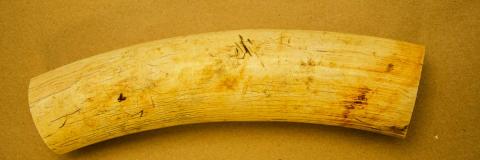

The Ivory Project
Read about our important work being done on ivory trade
The Ivory Project was launched in the House of Commons in November 2015 by Caroline Cox, alongside Dr. Nicholas Pamment, and has since gained considerable attention and momentum. The aim of the project is to consider the role played by the UK’s antiques trade in the trade in ivory.
The project is a collaboration across four departments:
- Portsmouth Law School
- School of Criminology and Criminal Justice (SCCJ)
- Forensics
- Economics and Finance Subject Group
The Ivory Project focuses on one particular and contested link in the chain of ivory sales – the antiques trade. In the Portsmouth Law School, the project aims to explore the extent of the trade in ivory goods amongst antique dealers and auction houses based in the United Kingdom. In doing so, it is hoped that this area of commerce, of which very little is known, can be better understood and regulated both nationally and internationally. This will be accomplished by raising awareness of the current legislation surrounding the trade in ivory goods in the UK through sharing research findings.
The project launch was attended by a wide variety of key stakeholders, including, leading academics, conservationists, representatives from antique trade associations, representatives from the police and MP Caroline Nokes.
This spirit of collaboration and co-operation between all parties affected by the trade in ivory cuts to the heart of the project. It is hoped that by liaising with key stakeholders, the project can thoroughly evaluate the trade in ivory within the UK.
Background
Chatham House’s 2014 report 'Global Impacts of the Illegal wildlife Trade' highlighted the fact that the illegal trade in ivory has more than doubled since 2007, with prices of ivory and rhino horn exceeding that of platinum on the Chinese black market. It is estimated that the illegal wildlife trade is worth in excess of $10 billion per year.
The report bears witness to the interconnections between many things, such as:
- poverty
- terrorism
- a demand from parts of Asia for ivory-based medicine products
- civil conflict
- a discordance between legislation at national and international levels
All of these have enabled trade to increase. It also highlights the fact that to date, much of the analysis done in respect of the illegal trade, has been focused on the front end of the chain of trade – the poaching.
The Obama administration destroyed six million tonnes of confiscated ivory. In 2012, five tonnes of illegal ivory was destroyed in Gabon and in 2013 the UK government announced a £10 million grant to support the efforts to tackle the illegal ivory trade.
The antiques trade, as other sellers of ivory, is subject to the 1973 Convention on the International Trade in Endangered Species of Wild Fauna and Flora (CITES). The aim of CITES is to ensure that the international trade in wild animals and plants does not threaten the survival of those plants and animals.
Currently, there are 181 countries which are signatories to CITES. However, the evidence discussed above clearly suggests that the good intentions of CITES are not being effectively implemented at a national or international level. National and international law enforcement needs to be carefully considered in order for national governments to make and implement policy decisions at a local and international level. Similarly, to be effective, legislation and regulation needs to be consistent, clear and implementable.
After launching the project, our research team begun conducting interviews with dealers and auctioneers and a questionnaire was released to the UK antiques trade.
The project will run, initially for one year and will end with the publication of a report aimed at the trade, but requested by DEFRA, which will consider the extent of the UK’s legal and illegal ivory trade.
Recent publications
-
International organisations and the ivory sales ban debate: The case of Zimbabwe, Namibia and Botswana
Cox, C. (2022) "International organisations and the ivory sales ban debate: The case of Zimbabwe, Namibia and Botswana", Protected Areas and Tourism in Southern Africa, Routledge
-
The evolution of regional wildlife conservation, environmental protection and anti-poaching law in the Southern African development community
Mogomotsi, G.E.J, Mogomotsi, P.K., Cox, C. (2020) "The evolution of regional wildlife conservation, environmental protection and anti-poaching law in the Southern African development community", Commonwealth Law Bulletin
-
The elephant in the courtroom: an analysis of the Ivory Act 2018, its path to enactment and potential impact on the illegal trade in ivory
Cox, C. (2021) "The elephant in the courtroom: an analysis of the Ivory Act 2018, its path to enactment and potential impact on the illegal trade in ivory", Journal of International Wildlife Law and Policy
The Ivory Project in the media
- Five ivory objects that will be exempt from a proposed trade ban
- Paradigm shift as African countries throw their weight behind ivory ban
- How Tory U-turn on the antique ivory trade will threaten elephants in the wild
- The Elephant in the Sale Room: New Report Calls for Significant Change to UK Regulations on the Sale of Ivory
- Letter to Theresa May
- Why China's ivory ban is a mammoth step towards saving the elephant
- Questions raised over methodology of report that calls for changes to ivory regulation
- Ivory research project launched
Find out more
Research projects
Read more about the projects we're working on, and those which we've recently completed – and find out how they're making a difference.

